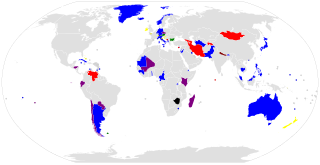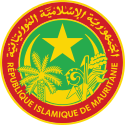
Mauritania is a presidential democracy, but has suffered from repeated military coups since its Independence in November 1960. For 18 years after independence, Mauritania was a one-party state under Moktar Ould Daddah. This was followed by decades of military rule. The first fully democratic presidential election in Mauritania occurred on 11 March 2007, which marked a transfer from military to civilian rule following the military coup in 2005. The election was won by Sidi Ould Cheikh Abdallahi, who was ousted by another military coup in 2008 and replaced by general Mohamed Ould Abdel Aziz. Mauretania underwent its first peaceful transition of power after the 2019 presidential election, although this was between two presidents of the ruling UPR party and former army generals.

A senate is a deliberative assembly, often the upper house or chamber of a bicameral legislature. The name comes from the ancient Roman Senate, so-called as an assembly of the senior and therefore considered wiser and more experienced members of the society or ruling class. However the Roman Senate was not the ancestor or predecessor of modern parliamentarism in any sense, because the Roman senate was not a de jure legislative body.
Bicameralism is a type of legislature that is divided into two separate assemblies, chambers, or houses, known as a bicameral legislature. Bicameralism is distinguished from unicameralism, in which all members deliberate and vote as a single group. As of 2022, roughly 40% of the world's national legislatures are bicameral, while unicameralism represents 60% nationally and much more at the subnational level.

The national flag of Mauritania is a green field containing a gold star and crescent, with two red stripes at the top and bottom of the field. The original national flag was introduced under the instructions of President Moktar Ould Daddah and the constitution of 22 March 1959 and was officially adopted on 1 April 1959.
The National anthem of Mauritania, also known by its incipit, "Bilāda l-ʾubāti l-hudāti l-kirām", was officially adopted on 28 November 2017 and was composed by Egyptian composer Rageh Daoud.

Elections in Mauritania encompass four different types: presidential elections, parliamentary elections, regional elections and local elections.

The Mauritanian Parliament is composed of a single chamber, the National Assembly. Composed of 176 members, representatives are elected for a five-year term in single-seat constituencies.

The Seal of the Islamic Republic of Mauritania is the national emblem based on the national flag of Mauritania, which was officially adopted on 15 August 2017.
In December 1984, Haidallah was deposed by Colonel Maaouya Ould Sid'Ahmed Taya, who, while retaining tight military control, relaxed the political climate. Ould Taya moderated Mauritania's previous pro-Algerian stance, and re-established ties with Morocco during the late 1980s. He deepened these ties during the late 1990s and early 2000s as part of Mauritania's drive to attract support from Western states and Western-aligned Arab states. Mauritania has not rescinded its recognition of Polisario's Western Saharan exile government and remains on good terms with Algeria. Its position on the Western Sahara conflict has been, since the 1980s, one of strict neutrality.

Mohamed Ould Abdel Aziz is a retired Mauritanian military officer and politician who served as the 8th President of Mauritania from 2009 to 2019.

Mauritania, formally the Islamic Republic of Mauritania, is a sovereign country in Northwest Africa. It is bordered by the Atlantic Ocean to the west, Western Sahara to the north and northwest, Algeria to the northeast, Mali to the east and southeast, and Senegal to the southwest. By land area Mauritania is the 11th-largest country in Africa and 28th-largest in the world; 90% of its territory is in the Sahara. Most of its population of some 4.3 million lives in the temperate south of the country, with roughly a third concentrated in the capital and largest city, Nouakchott, on the Atlantic coast.

This national electoral calendar for 2013 lists the national/federal elections held in 2013 in all sovereign states and their dependent territories. By-elections are excluded, though national referendums are included.

A constitutional referendum was held in Italy on 4 December 2016. Voters were asked whether they approved a constitutional law that amends the Italian Constitution to reform the composition and powers of the Parliament of Italy, as well as the division of powers between the State, the regions, and administrative entities.

A two-part constitutional referendum was held in Mauritania on 5 August 2017, having initially been planned for 15 July. Voters were asked whether they approve of proposed amendments to the constitution. Both proposals were approved by 86% of voters with a voter turnout of 54%.
The following lists events in the year 2017 in Mauritania.

This national electoral calendar for 2019 lists the national/federal elections held in 2019 in all sovereign states and their dependent territories. By-elections are excluded, though national referendums are included.

Regional elections were held in Mauritania on 1 and 15 September 2018, alongside parliamentary and local elections. They were the first elections to the newly created regional councils.








